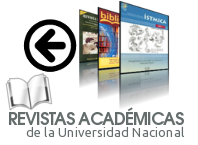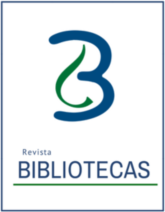Bibliometric and thematic evaluation of Education journals included in the Scimago Journal Rank
DOI:
https://doi.org/10.15359/rb.39-2.5Keywords:
bibliometric indicators, scientific journals, bibliometrics, education, scientific evaluation, Scimago Journal Rank (SJR)Abstract
The objective of this research is to analyze the Colombian education journals included in the Scimago Journal Rank (SJR), using bibliometric indicators and editorial quality criteria, which allow to know trends and behaviors both from a bibliometric and management perspective. A search was made of all the information registered by each journal in the Scopus database and after a cleaning process, production, citation and network indicators were obtained, as well as the analysis of inbreeding, attractiveness and other variables.
The main results were low average number of citations per document and the SJR (prestige indicator), 10% self-citation and journals with more than 20% endogamy, in addition to a high international participation in the contributions. With respect to the citations received, these come from journals in the same area and distributed in the different quartiles. In general, the methodology used provides elements on the status and evolution of the selected journals, which can also be applied to the study of others journals.
References
Abadal, E. (2018). ¿Cómo han cambiado BiD y las revistas españolas de documentación en los últimos veinte años? BiD: Textos universitaris de biblioteconomia i documentació, (40), 1-10. https://doi.org/10.1344/BiD2018.40.11
Aguado, E., Rogel, R., Garduño, G., & Zúñiga, M.F. (2008). RedALyC: una alternativa a las asimetrías en la distribución del conocimiento científico. Ciencia, docencia y tecnología, 19 (37), 11-30.
Alperin J. P., & Rozemblum C. (2017). La reinterpretación de visibilidad y calidad en las nuevas políticas de evaluación de revistas científicas. Revista interamericana de bibliotecología, 40 (3), 231-241. https://doi.org/10.17533/udea.rib.v40n3a04
Borrego, Á., & Urbano, C. (2006). La evaluación de revistas científicas en Ciencias Sociales y Humanidades. Información, cultura y sociedad, (14), 11-27. https://doi.org/10.34096/ics.i14.886
Cetto, A. M. (1998). Ciencia y producción científica en América Latina. El proyecto Latindex. International Microbiology, 1 (3), 181-182.
Charum, J. (2004). La construcción de un sistema nacional de indexación, el caso de Publindex. Convergencia. Convergencia. Revista de ciencias sociales, 11 (35), 293-309.
Delgado-López-Cózar, E. (2001). Las revistas españolas de ciencias de la documentación: productos manifiestamente mejorables. El profesional de la información, 10 (12), 46-56. En: http://profesionaldelainformacion.com/contenidos/2001/diciembre/10.pdf
Delgado-López-Cózar, E. (2017). Evaluar revistas científicas: un afán con mucho presente y pasado e incierto futuro. En Abadal, E. (Ed.), Revistas científicas: situación actual y retos de futuro (pp. 73-103). Universitat de Barcelona. España.
Delgado-López-Cózar, E., Ruiz-Pérez, R., & Jiménez-Contreras, E. (2006). La Edición de Revistas Científicas Directrices, Criterios y Modelos de Evaluación. Universidad de Granada, España.
Delgado-López-Cózar, E., Ruiz-Pérez, R., Jiménez-Contreras, E., López-Herrera, A. G., Gacto-Colorado, M. J., Torres-Salinas, D., & Poyatos-Huertas, E. (2005). INRECS: Índice de impacto de las revistas españolas de ciencias sociales. Biblio 3W, Revista bibliográfica de geografía y ciencias sociales, 10 (574). En: http://www.ub.edu/geocrit/b3w-574.htm
Garfield, E. (1955). Citation indexes for science: A New Dimension in Documentation through Association of Ideas. Science, 122 (3159), 108-111. 10.1126/science.122.3159.108
González-Alcaide, G., Gorraiz, J., & Hervás-Oliver, J.L. (2018). On the use of bibliometric indicators for the analysis of emerging topics and their evolution: Spin-offs as a case study. El profesional de la información, 27 (3), 493-510. https://doi.org/10.3145/epi.2018.may.04
Gregorio-Chaviano, O., Repiso, R., Calderón-Rehecho, A., León-Marín, J., & Jiménez-Contreras, E. (2021). Dialnet Métricas como herramienta de evaluación bibliométrica: aportes al análisis de la actividad científica en Ciencias Sociales y Humanidades. El profesional de la información, 30(3). https://doi.org/10.3145/epi.2021.may.18
López-Robles, J.R., Guallar, J., Otegi-Olaso, J.R., & Gamboa-Rosales, N.K (2019). El profesional de la información (EPI): bibliometric and thematic analysis (2006-2017). El profesional de la información, 28 (4), e280417. https://doi.org/10.3145/epi.2019.jul.17
Maltrás, B. (2003). Indicadores bibliométricos: fundamentos y aplicación al análisis de la ciencia. Ediciones Trea. Gijón.
Martínez-Ávila, D. (2019). Qualis Periódicos: el sistema brasileño de evaluación de revistas. Anuario ThinkEPI, 13, e13e01. https://doi.org/10.3145/thinkepi.2019.e13e01
Ministerio de Ciencia, Tecnología e Innovación. (2020). Convocatoria para indexación de revistas científicas colombianas especializadas - Publindex 2020. https://minciencias.gov.co/convocatorias/fortalecimiento-capacidades-para-la-generacion-conocimiento/convocatoria-para
Packer, A.L., Prat, A.M., Luccisano, A., Montanari, F., Santos, S., & Meneghini, R. (2006). El modelo SciELO de publicación científica de calidad en acceso abierto. En: Babini, D., & Fraga, J. (eds.), Edición electrónica, bibliotecas virtuales y portales para las ciencias sociales en América Latina y El Caribe. Buenos Aires, Consejo Latinoamericano de Ciencias Sociales, pp. 191–208. ISBN 9871183534
Peralta, M. J., Frías, M. F., & Gregorio, O. (2015). Criterios, clasificaciones y tendencias de los indicadores bibliométricos en la evaluación de la ciencia. Revista cubana de información en ciencias de la salud (ACIMED), 26 (3), 290-309. http://scielo.sld.cu/pdf/ics/v26n3/rci09315.pdf
Repiso, R., Moreno-Delgado, A., & Aguaded, I. (2021). Factors affecting the frequency of citation of an article. Iberoamerican Journal of Science Measurement and Communication, 1(1). https://doi.org/10.47909/ijsmc.08
Repiso, R., Jiménez-Contreras, E., & Aguaded, I. (2017). Revistas Iberoamericanas de Educación en SciELO Citation Index y Emerging Source Citation Index. Revista española de documentación científica, 40 (4), 1-13. e186 https://doi.org/10.3989/redc.2017.4.1445
Rodríguez, E., Naranjo, S., & González, D. L. (2015). Publindex: más que un proceso de indexación. El Ágora USB, 15(1), 29-41.
Rodríguez, L. (2010). Las revistas iberoamericanas en Web of Science y Scopus: visibilidad internacional e indicadores de calidad. VII Seminario Hispano-Mexicano de Investigación en Bibliotecología y Documentación. México. https://digital.csic.es/bitstream/10261/23811/1/LuisRY7Encuentro.pdf
Rodríguez-Gairín, J.M., Somoza-Fernández, M., & Urbano, C. (2011). MIAR: hacia un entorno colaborativo de editores, autores y evaluadores de revistas. El profesional de la información, 20 (5), 589-595. https://doi.org/10.3145/epi.2011.sep.15
Torres-Salinas, D., Bordons, M., Giménez-Toledo, E., Delgado-López-Cózar, E., Jiménez-Contreras, E., & Sanz-Casado, E. (2010). Clasificación integrada de revistas científicas (CIRC): propuesta de categorización de las revistas en ciencias sociales y humanas. El profesional de la información, 19 (6), 675-683. 10.3145/epi.2010.nov.15
Vasen, F., & Lujano, I. (2017). Sistemas nacionales de clasificación de revistas científicas en América Latina: tendencias recientes e implicaciones para la evaluación académica en ciencias sociales. Revista mexicana de ciencias políticas y sociales, 62 (231), 199-228.
Van, NJ., & Waltman, L. (2009). How to normalize cooccurrence data? An analysis of some well-known similarity measures. Journal of the American Society for Information Science and Technology, 60 (8), 1635–1651. https://doi.org/10.1002/asi.21075
Van, NJ., & Waltman, L. (2010). Software survey: VOSviewer, a computer program for bibliometric mapping. Scientometrics, 84 (2), 523–538. https://doi.org/10.1007/s11192-009-0146-3
Waltman, L., Van, N. J., & Noyons, Ed. C. M. (2010). A unified approach to mapping and clustering of bibliometric networks. Journal of Informetrics, 4 (4), 629–635. https://doi.org/10.1016/j.joi.2010.07.002
Downloads
Published
How to Cite
Issue
Section
License
Bibliotecas provide immediate open access to their content, based on the principle of facilitating research to the public free of charge and free of charge to promote the global exchange of knowledge.
The journal Bibliotecas is a publication hosted by a public higher education institution, which is supported by public resources. Since its inception, the magazine has offered all its contents free of charge without any restriction on the rights of: reading, downloading and printing in full text. Works published in libraries may be analyzed, quoted and reproduced in whole or in part, mentioning the original source.
The journal Bibliotecas is licensed under the Creative Commons Attribution - Non-Commercial - Share Equal, 4.0 International license; therefore, it is allowed to: share, copy and redistribute the material in any medium or format.

Este obra está bajo una licencia Creative Commons Atribución-NoComercial-CompartirIgual 4.0 Internacional.








